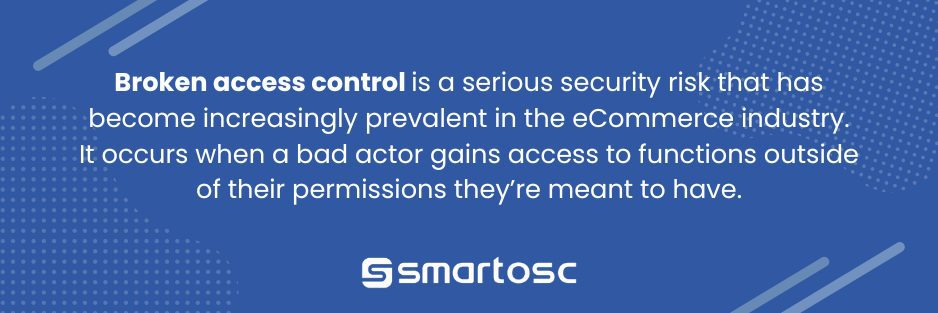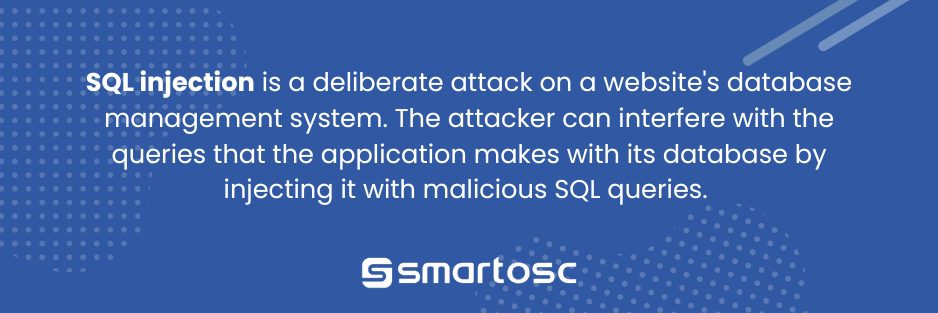UK Office
Clyde House
Reform Rd, Maidenhead SL6 8BY
UK: +44 (0)20 4586 9430
Give us a call or send a message
Resources
Company
© Copyright 2023 SmartOSC. All right reserved.
Made by Skouter Digital

In the world of eCommerce, there’s no doubt that there’s a lot of potential for growth and success. With the right strategies in place, businesses can boost their revenue and profits to new heights. However, as with any industry, there are risks that come with it. Making the wrong decisions or neglecting to address certain issues can result in significant financial losses. Especially for eCommerce businesses, security risks can be costly.
Amazon, one of the largest and most successful online retailers in the world, is a prime example of how even the biggest companies can fall victim to security risks. In 2018, an outage on Prime Day resulted in nearly US$100 million in lost sales for the company. This serves as a reminder that eCommerce businesses of all sizes and budgets can be impacted by security issues, and it’s important to take proactive measures to prevent them.
Instead of ignoring the potential dangers lurking in the eCommerce industry, it’s essential to be aware of the security risks that may impact your business. Therefore, we have decided to delve deeper into three of the most common security risks that eCommerce businesses face and offer practical solutions to mitigate them.
Broken access control is a serious security risk that has become increasingly prevalent in the eCommerce industry. It occurs when a bad actor gains access to functions outside of their permissions they’re meant to have. This can have disastrous consequences, such as an unauthorized user having admin privileges to your webstore, allowing them to delete listings, change prices, and cause other forms of damage.

According to the Open Web Application Security Project (OWASP), broken access control is the most common security weakness online. As a result, numerous eCommerce sites are vulnerable to this security flaw. It’s alarming how something so damaging can be caused by such a simple security flaw.
An example of a real-world broken access control issue was discovered by researcher Laxman Muthiyah on the world’s biggest social media platform, Facebook. Back in 2015, Muthiyah identified a vulnerable API endpoint on Facebook that enabled anyone to become the administrator of any Facebook page. This flaw had serious implications, given how many businesses depend on their Facebook page, and the vast amounts of money spent on Facebook advertising every day.
The second security risk on the OWASP list is cryptographic failure, which can result in exposing sensitive data that anyone can view. While not as dangerous as broken access control, it can still cause significant harm. Essentially, cryptographic failure happens when an entity mishandles information, such as client data being accessible as a plain text file on a website.

Cryptographic failure is sometimes referred to as sensitive data exposure, which may be a more descriptive term for those unfamiliar with the field. Even though it can happen unintentionally, the consequences can be severe. For instance, cybersecurity company UpGuard discovered in 2019 that Facebook user data for millions of people was being stored without adequate security on Amazon’s cloud servers. This cryptographic failure reportedly affected more than 500 million people. As demonstrated, the damage from cryptographic failure can be significant, even if there is no malicious intent involved.
Unlike some security vulnerabilities that can occur unintentionally, an SQL injection attack requires deliberate action from the attacker.
SQL, or Structured Query Language, is a widely used language for managing relational databases and is an essential component of many websites, making it an attractive target for attackers. An SQL injection is a deliberate attack on a website’s database management system. The attacker can interfere with the queries that the application makes with its database by injecting it with malicious SQL queries. SQL is a widely used language for handling structured data and relational database management systems, making it a prime target for bad actors. An SQL injection can occur when the backend code is vulnerable and can result in severe consequences.

One of the most costly SQL injection attacks occurred in 2009, where American retailers incurred losses of around US$300 million. In this case, an attacker compromised 100 million credit cards by exploiting a vulnerability in the backend code. Therefore, it is crucial to ensure that proper measures are taken to secure database management systems and prevent SQL injections.
How to protect your eCommerce site
Protecting your eCommerce site from security risks doesn’t have to be a daunting task. The solution can be summed up in one word – testing. Although this may seem like an oversimplification, investing in automated testing can save you a lot of trouble in the long run.
Automated testing allows for efficient and cost-effective testing of your website. Specific testing protocols can be implemented for each risk mentioned above, but it’s important to identify which risks are most critical to your site and allocate resources accordingly. By investing in automated testing, you can ensure that your website is secure and minimize the risk of financial loss due to security breaches.
Share this
Nail salons are currently undergoing substantial growth, making it imperative to contemplate investing in a specialized POS (point of sale) system designed specifically for this industry. Utilizing a POS system within a nail salon offers many advantages, encompassing efficient inventory…
Retail POS software plays a pivotal role in assisting retailers with transaction processing, inventory management, sales tracking, and data analysis. Moreover, it serves as a vital tool that ensures a streamlined shopping experience across various locations and channels. This software…
How to Expand Your Business Cross-Border from the UK Since Brexit, UK companies have faced new hurdles in conducting ecommerce beyond their borders. The complexities of cross-border trade and changing regulations have posed challenges for expansion into the new markets.…
UK: +44 (0)20 4586 9430
Give us a call or send a message
© Copyright 2023 SmartOSC. All right reserved.
Made by Skouter Digital